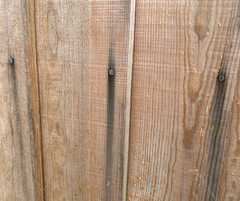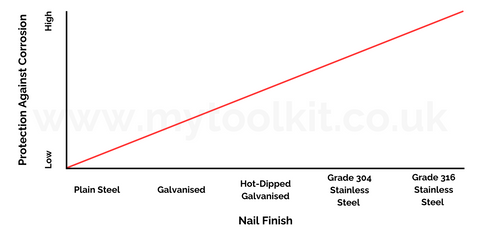When it comes to manufacturing fence panels, your choice of nails is crucial. The type of nail used can impact the overall quality and durability of the fence. In this article, we'll explore the benefits of using stainless steel nails for manufacturing fence panels and why galvanised or bright finish nails may bleed in the long-term. This information is crucial if you want to avoid being called back to rectify an old job...

What are stainless steel nails?
Stainless steel nails are made from an alloy of steel and chromium, which provides excellent corrosion resistance. This makes them ideal for outdoor applications, such as fencing, garden building manufacturing and shed building etc. The chromium in stainless steel reacts with oxygen to form a thin, invisible layer of chromium oxide on the surface of the nail. This layer acts as a protective barrier between the timber and the nail, preventing rust and corrosion.
Benefits of using stainless steel nails
There are several benefits to using stainless steel nails for manufacturing fence panels:
1. Corrosion resistance
Stainless steel nails are highly resistant to corrosion, even in harsh outdoor environments. This means that fence panels made with stainless steel nails will have a longer lifespan and require less maintenance compared to those made with other finishes of nails.
2. Strength, durability and holding power
Stainless steel nails are known for their strength, durability and holding power. They are able to withstand high levels of tension and pressure, making them ideal for securing fence panels. In turn, this ensures that the fence will remain sturdy and intact, even in challenging weather conditions.
3. Aesthetic appeal
Stainless steel nails are brighter and shiner than other nails, giving them a sleek and modern appearance. Consequently, this can can enhance the overall aesthetic appeal of the fence panels and be used as a selling point for your customers. They blend well with different types of wood, especially cedar, and can add a touch of elegance to any outdoor space.
Why do galvanised and bright nails bleed?
Galvanised and bright nails, on the other hand, may bleed when used in fence panel manufacturing. Bleeding refers to the process where the nails release a reddish-brown substance, known as tannins, when they come into contact with certain types of wood. This can stain the wood and affect its appearance.
Bright nails aren't finished with much of a coating and as a result, there is no protective layer between the steel and the timber. Electro-Galvanised nails have a thin layer of pure zinc that surrounds them, meaning you could see bleeding as soon as a month after installation depending on the environment. Having said that, these nails are somewhat inexpensive when compared with stainless steel.
There is one other type of a galvanised finish and this is hot-dipped galvanised. These nails are submerged in a molten bath of zinc which creates a thick layer of zinc-alloy around them. The alloy provides greater protection against bleeding but we have seen scenarios where these nails have bled within eight months of installation. This type of nail is seen much less frequently in the fencing industry as they're only available in a small range of sizes and shanks.

How to prevent bleeding
Preventing bleeding is simple really - use stainless steel nails instead of galvanised or bright nails. Stainless steel nails do not react with wood and therefore do not release tannins. This ensures that the fence panels remain free from stains and maintain their original appearance over time.
Concluding Remarks
When it comes to manufacturing fence panels, the choice of nails is crucial. Stainless steel nails offer numerous benefits, including corrosion resistance, strength, durability, and aesthetic appeal. They are a reliable choice for ensuring the longevity and quality of fence panels. By using stainless steel nails, you can avoid the issue of bleeding that may occur with galvanised or bright nails. So, if you want to manufacture fence panels that stand the test of time, consider using stainless steel nails.
For more fencing tips and insights, stay tuned to our blog. Happy nailing!
If you're still confused or have any further questions, don't hesitate to get in touch. You can reach us on 0333 8000 345, info@mytoolkit.co.uk or DM us on our social media channels @mytoolkitonline.
P.s., Subscribe to our newsletter & get useful hints, tips & tricks directly to your inbox!
** When using nails, staples or any tooling equipment, it's important to follow safety guidelines and use them responsibly.




